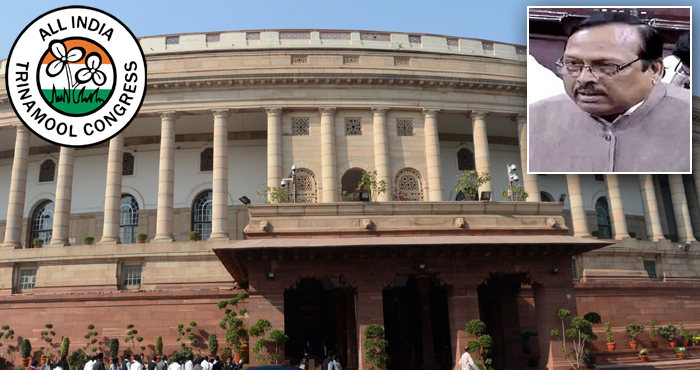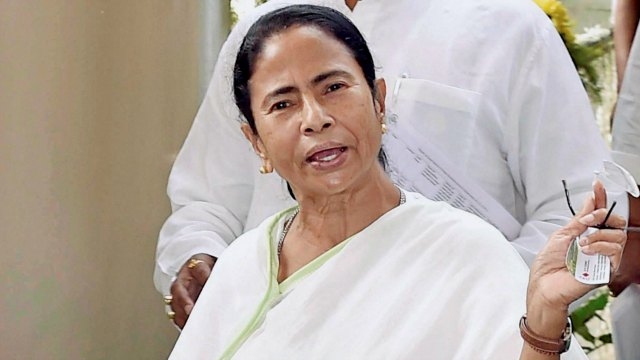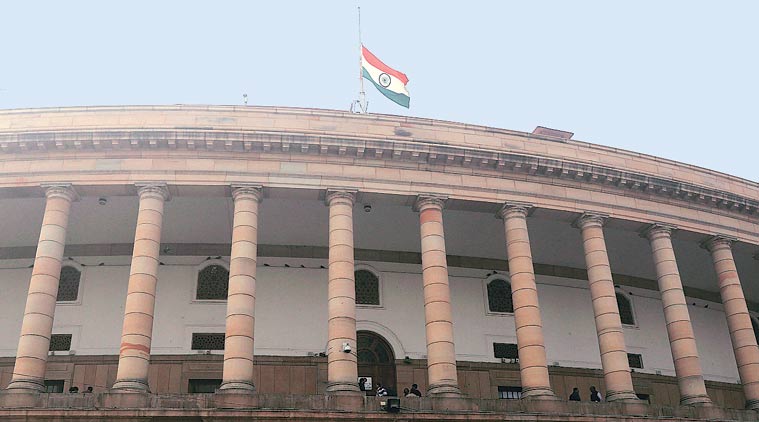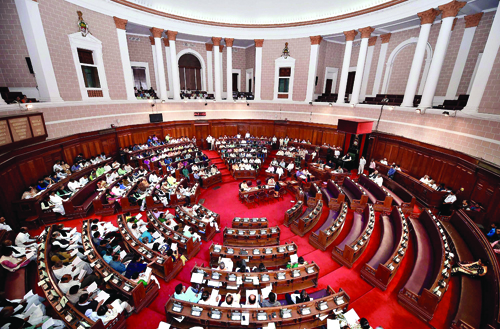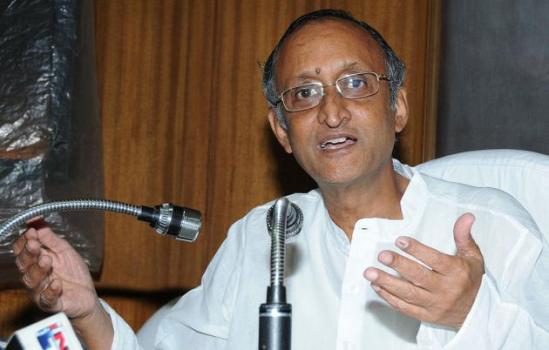Bengal Finance Minister Dr Amit Mitra today held a press conference in Kolkata regarding Goods and Services Tax (GST). During the interaction with the press, he underlined the fact that Bengal is not ready to accept GST in its current form.
Dr Mitra is the chairman of the Empowered Committee on GST, comprising all the 29 States was. It had met in Kolkata on June 14, 2016 in a historic meeting.
The constitutional amendment said that Parliament may, on the recommendation of the GST Council, compensate States for loss of revenue arising out of implementation of GST, upto five yrs. Secondly, for a State, if the income from tax decreases at any time during these five years, the State can decide to not to give its share of the tax to the Centre.
However, Dr Mitra said, “it was decided at this meeting that it should be ‘shall’, not ‘may’, and secondly, not ‘upto 5 years’ but ’period of 5 years’ “.
Other major decisions were taken during the historic meeting in Kolkata.
“It was decided at the meeting that if a business is worth less than Rs 1.5 crore, it would only attract State tax”.
Then, “in the cases 90 per cent of small businesses below Rs 1.5 crore, there would not be any dual control”.
At the 4th GST summit (November 3 and 4), the States had proposed that food grains have to be kept out of GST. “After everyone consented to it, food grains are now tax-free. This is a major victory for the common man”.
The Bengal Finance Minister said, “Daily essentials like raw vegetables and flowers are now tax-free”.
“We have fought to make cottage cheese, puffed rice, flattened rice, betel leaves, popped rice, green tea, vermilion, aalta, organic fertilizers, poultry and khadi clothing tax-free, health services, doctors’ fees, newspapers, textbooks and human hair.”.
Another victory for the States is that “on processed tea, instead of a 12-18 per cent tax, 5 per cent tax has been imposed”.
“The Empowered Committee has given a letter to also make news printing tax-free”, Dr Mitra said.
Some other major victories for the States, as stated by the Finance Minister, are:
He further said, “A 12% tax was proposed on cashew nuts; the fight on that is still going on”.
“They had said that shoes would be taxed at 12%; we have proposed that shoes costing up to Rs 500 should be tax-free”
On films, Dr Mitra said, “In West Bengal, films are taxed at 2% while the Centre is thinking of imposing a 28% tax. We will fight this. If regional films are taxed at 28%, won’t they bite the dust?”
He said, “Though my own powers are limited, I have fought for Maa-Mati-Manush under the inspiration of the Chief Minister and I will continue my fight”.
The Bengal Finance Minister said that GST is not fully prepared and ready, and that rules and forms not completed, so July 1 must not be finalised as the date for the roll-out of GST.
“Until and unless a solution is reached on GST, it will not be introduced in the Bengal assembly”
He questioned whether small and medium-scale industries are equipped to handle the new tax regime.
“The fight is still on,” Dr Amit Mitra said, pointing out that he is likely to attend the June 3 GST Council meeting. “Majority of the country is still not ready to roll out GST,” he added.
১লা জুলাই থেকে জিএসটি চালু হবে কিনা তা নিয়ে সংশয় প্রকাশ করলেনঃ অর্থমন্ত্রী
জিএসটি নিয়ে নবান্নে সাংবাদিক বৈঠক করেন অর্থমন্ত্রী অমিত মিত্র। তিনি বলেন, ২৯ টি রাজ্য ও ২ টি ইউনিয়ন টেরিটরি নিয়ে জিএসটি’র এমপাওয়ার্ড কমিটি গঠন হয়েছে, সেখানে আমাকে চেয়ারম্যান নির্বাচিত করে। ১৪ জুন ২০১৬ কলকাতায় এমপাওয়ার্ড কমিটি’র ঐতিহাসিক বৈঠক হয়। সংসদে বিল পাস হওয়ার পর চালু হল জিএসটি কাউন্সিল যা হল সর্বোচ্চ উপদেষ্টা মণ্ডলী, যার চেয়ারম্যান হলেন কেন্দ্রীয় অর্থমন্ত্রী।
তিনি বলেন, সাংবিধানিক সংশোধনীর বক্তব্য অনুযায়ী রাজ্যের রাজস্ব কমে গেলে তাহলে তারা ক্ষতিপূরণ দিতে পারে, কোন নিশ্চয়তা নেই। দ্বিতীয়ত, ৫ বছরের যে কোন সময় যদি রাজস্ব কমে যায় কেন্দ্রীয় সরকার ঠিক করতে পারে যে তারা রাজস্ব দেবে না। ওই কলকাতার বৈঠকে ঠিক হয় “it should be ‘shall’, not ‘may’, and secondly, not ‘upto 5 years’ but ’period of 5 years।”
ওই বৈঠকে আরও সিদ্ধান্ত নেওয়া হয়, রাজ্যে ১.৫ কোটির নিচে ব্যবসা হলে তাদের ক্ষেত্রে শুধু রাজ্যের কন্ট্রোল থাকবে। জিএসটি কাউন্সিল তৈরি হলে অবশেষে সিদ্ধান্ত হল ১.৫ কোটির নিচে ৯০ শতাংশ ছোট ব্যবসায় দ্বৈত নিয়ন্ত্রণ থাকবে না।
চতুর্থ জিএসটি বৈঠকে (৩ ও ৪ নভেম্বর) আমরা প্রস্তাব দিয়েছিলাম খাদ্যশস্য জি এস টির বাইরে রাখতে হবে, সকলে সম্মতি দেওয়ায় এখন খাদ্যশস্য করমুক্ত। এটা সাধারন মানুষের একটা বড় পাওনা।
কাঁচা সবজি, ফল, স্বাস্থ্য পরিষেবা, ডাক্তারের ফি, নিউজ পেপার এগুলো করমুক্ত হয়েছে, যা সাধারন মানুষের প্রয়োজনীয়। ছানা, মুড়ি, চিড়ে, পানের পাতা, খই, সবুজ চা, সিঁদুর, আলতা, পোল্ট্রি, জৈব সার, খাদির জামাকাপড় ওপর ট্যাক্স বসাচ্ছিল, লড়াই করে এগুলো করমুক্ত করেছি আমরা।
তিনি আরও বলেন, জুতোর অপর ১২ ট্যাক্স বসাবে বলেছিল, আমরা প্রস্তাব দিয়েছি ৫০০ টাকা পর্যন্ত কোন কর ছাড় দিতে হবে।নিউজ প্রিন্টিং করমুক্ত করার জন্য আমরা চিঠি দিয়েছি, কাজুর ওপর ১২ ট্যাক্স বসাবে বলেছিল, সেই নিয়ে লড়াই এখনো বাকি।
বর্তমানে পশ্চিমবঙ্গে সিনেমার ওপর ট্যাক্স ২ শতাংশ, আজ কেন্দ্রীয় সরকার ২৮ শতাংশ ট্যাক্স বসানোর চিন্তা করছে, আমাদের লড়াই জারি রয়েছে, আঞ্চলিক ভাষার ছবিতে যদি ২৮% ট্যাক্স বসানো হয় তাহলে তা ধুলিস্মাত হয়ে যাবে।সবশেষে তিনি বলেন, আমার একার ক্ষমতা সীমাবদ্ধ তবুও মুখ্যমন্ত্রীর অনুপ্রেরণায় মা-মাটি-মানুষের জন্য লড়াই করেছি এবং এই লড়াই চালিয়ে যাব। জিএসটি পুরোপুরি তৈরী নয়। ১লা জুলাই এটি চূড়ান্ত হবে কিনা তা নিয়ে সংশয় প্রকাশ করেন অর্থমন্ত্রী বলেন যতক্ষণ না জিএসটি সমাধান হয় ততক্ষণ এটি বিধানসভাতেও পেশ করা হবে না।

